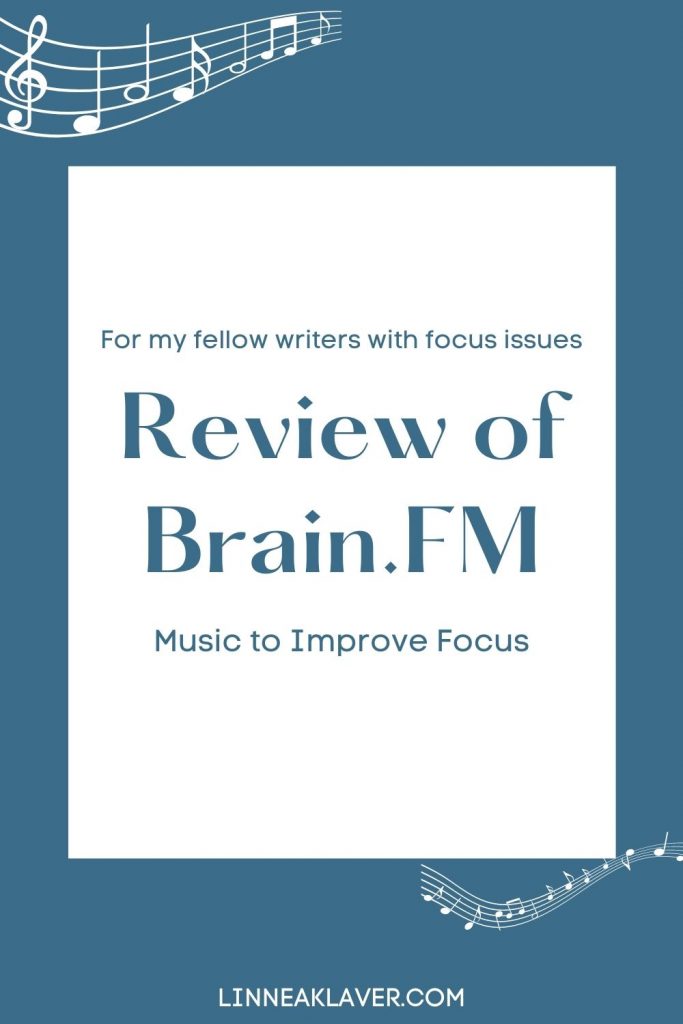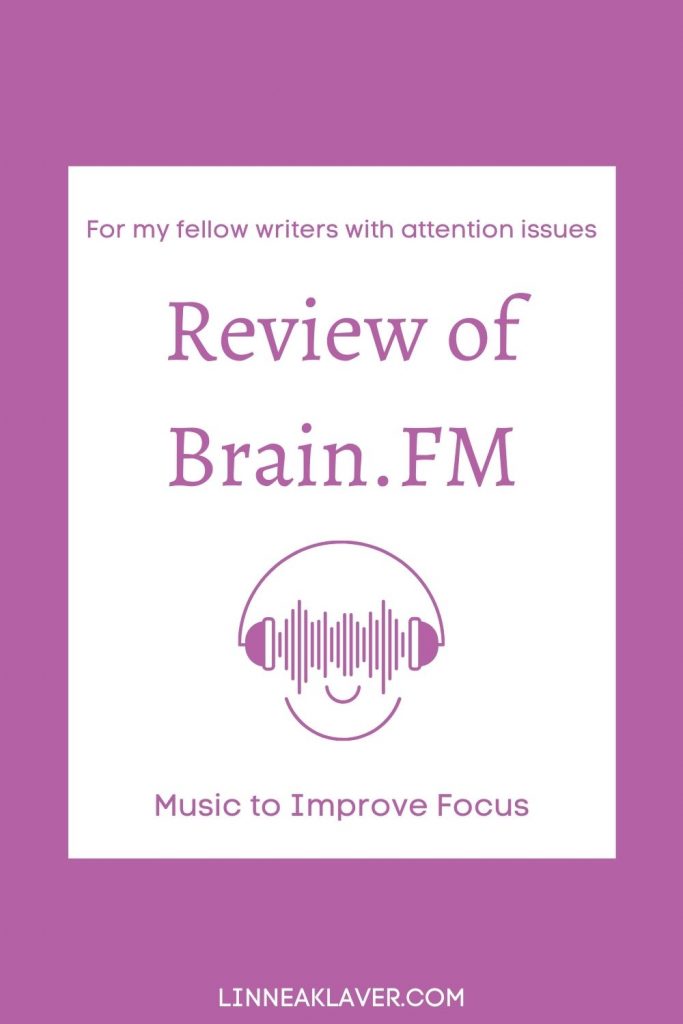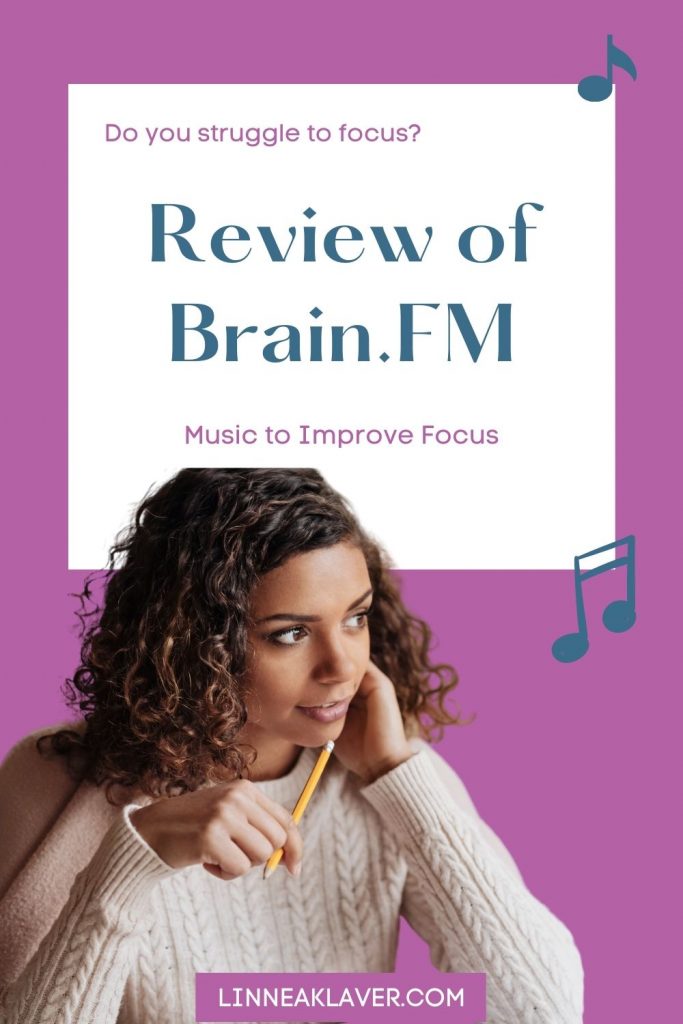Brain.fm is a website for background noise and music. It has options to help improve mindset for work, meditation, naps, or sleep. It markets itself as “functional music to improve focus in 15 minutes.”
Our science-first approach creates music that sounds different–and affects your brain differently–than any other music.
Brain.fm website
I used Brain.fm for a period of about a year and a half to two years as background music for my writing.

What Is Brain.fm?
Brain.fm is a website where you pay a subscription to use their library of music to help you focus while working or studying, but they also have music designed to help you relax enough to meditate or fall asleep. The music is specifically designed for people who have difficulty focusing, such as people with ADHD.
You have to make an account and pay a monthly or yearly fee in order to use it. The fee itself isn’t terribly expensive. My statement in November 2018 cost me about $64 CAD for a yearly subscription.
There is a free trial, where you can try the service for 3 days to decide whether it works for you. You have to make an account in order to access the free trial.
There is also an app for Apple and Android so that you can use it on your phone. All you need to do is download the app and log into your account to start listening.
How Does Brain.fm Work?
I can’t get into the science side of things because that’s beyond my pay grade, but you can find information on that over on their Frequently Asked Questions page and on their Science page. Its an interesting read!
As for the functionality, when you sign in you will have the option to select one of three options: Focus, Meditation, or Sleep. This may have changed in the last two years or so. Selecting one of the options will bring you to the music page where the music formulated for your desired activity will begin to play. You can set it to play for 30 minutes, 1 hour, or 2 hours. It will play automatically through the library while you work.
If you don’t like the sound of the music that was automatically decided on, you can access the music library through a tab at the top of the page that suits your tastes better. Options include music with ambient sounds of wind and rain, classical instruments, more “electronic” sounding music, and more. The music will be sorted depending on what effect its supposed to have on your brain, whether that’s to focus, relax, or sleep.
For the best results, Brain.fm recommends using earbuds or headphones. The effects are not immediate, but you should see results within 15 minutes.
Does It Work?
Yes! I was skeptical at first, but their free trial when I started using it was about 15 days long. I used it every day for those 15 days, and wow it made a huge difference!
As for how it worked on me, I can’t really describe the sensation. My brain started to tingle, and I found it easier to focus on what I was doing. Usually, I was writing. Like, my brain got quieter. All my busy thoughts faded to the background. I know that doesn’t make sense, but it’s really what it felt like to me.
I used it extensively during National Novel Writing Month to help me focus while getting my daily words down. And it totally worked.
It isn’t magic, of course. If you turn it on and start browsing social media, it’s not going to suddenly make you want to work on your project. You do have to have enough discipline to open your work in progress and start typing. Or painting. Or studying. Whatever it is that you sat down to do. But once you get started, the music makes it easier to maintain your momentum.
What About the Sleep and Meditation Options?
I’m not someone who meditates, so I didn’t use the meditation option. But I am someone who struggles to fall asleep, so I did use the sleep option a fair bit. The problem for me was that I don’t have my computer on while I sleep, so I had to use the phone app. My problem with the phone app was that it would freeze or get stuck on a loading screen. It doesn’t help if the music isn’t playing!
Brain.fm also still recommends that you use headphones while listening, but that can be uncomfortable when you’re trying to sleep. Especially if, like me, you have anxiety about the cord wrapping around your neck and strangling you in your sleep.
For me, the above things made Brain.fm not worth it to use for sleep. When it did work, it was great for helping my brain settle enough to sleep. I didn’t use it often, though.
Do I Still Use Brain.fm?
No.
Not because it doesn’t work or I don’t love it. But I lost my job in November 2019, and I could no longer afford it. One of the first things I did was sort through all of my subscriptions and purge anything that wasn’t absolutely necessary. Gotta save money where you can!
Then, of course, the pandemic hit. My financial situation still isn’t stable, so it’s an added expense that isn’t 100% necessary. It’s just something nice to have.
Once I’m able to, I’ll probably renew my subscription. I really enjoyed having Brain.fm as an option on those days when my brain just couldn’t deal.
For now, I’ve built my own playlists of instrumental music to listen to while I work. It doesn’t have the same brain effect as using Brain.fm does, but it helps. If you’re also looking for instrumental music to incorporate into your writing playlists, I wrote a post about my favourite piano composers. They’re all modern composers who feature heavily in my writing playlists, especially Tido Kang.
There are also a lot of great study mixes on Youtube created for this purpose, so experiment with some of those if you’re in the market for music. There are also a lot of instrumental covers of popular songs that you can add. Building your own playlist takes more work, but it’s more personalized to your taste.
Do I Recommend Brain.fm?
If you’re someone with focus and attention problems, yes. Definitely. It’s so helpful.
However, if you’re someone who doesn’t have an issue with focus or you’re just looking for some nice background music, there are plenty of free options. Therefore, a subscription to a separate website when you can get something like Spotify Premium and build as many unique playlists as you want might not be your best option.
And for those of you who are writers with attention problems (like me!), I also wrote a post about my favourite writing software, FocusWriter. I like to stack my focus aids, and FocusWriter is another tool that has really helped me. Plus, it’s free!


